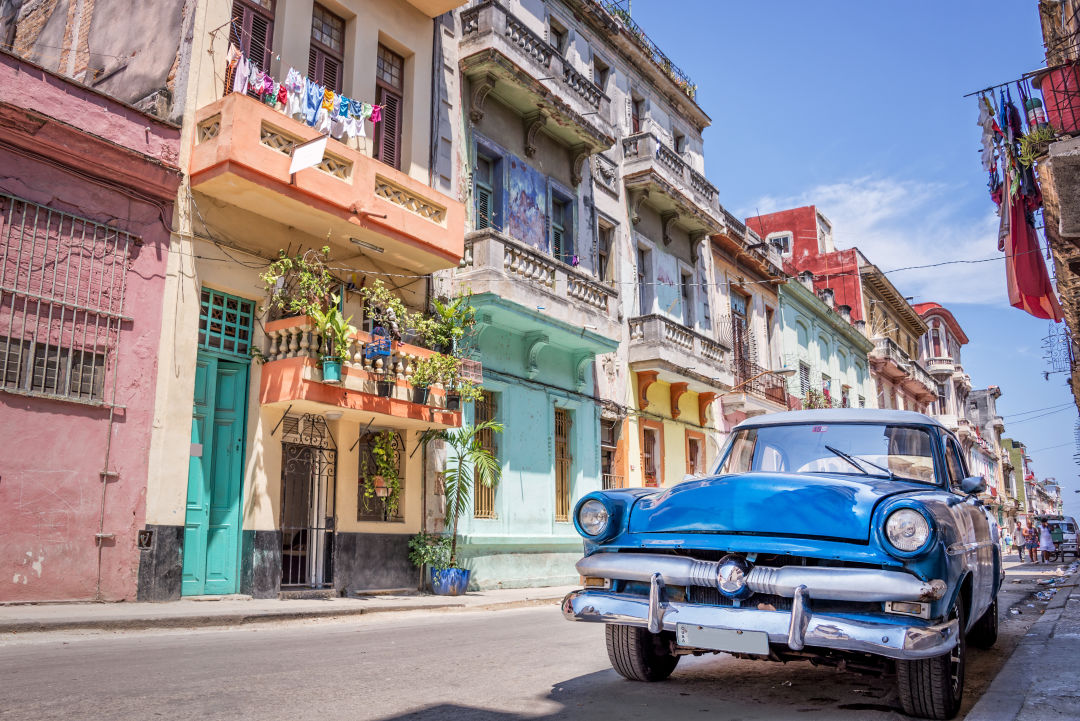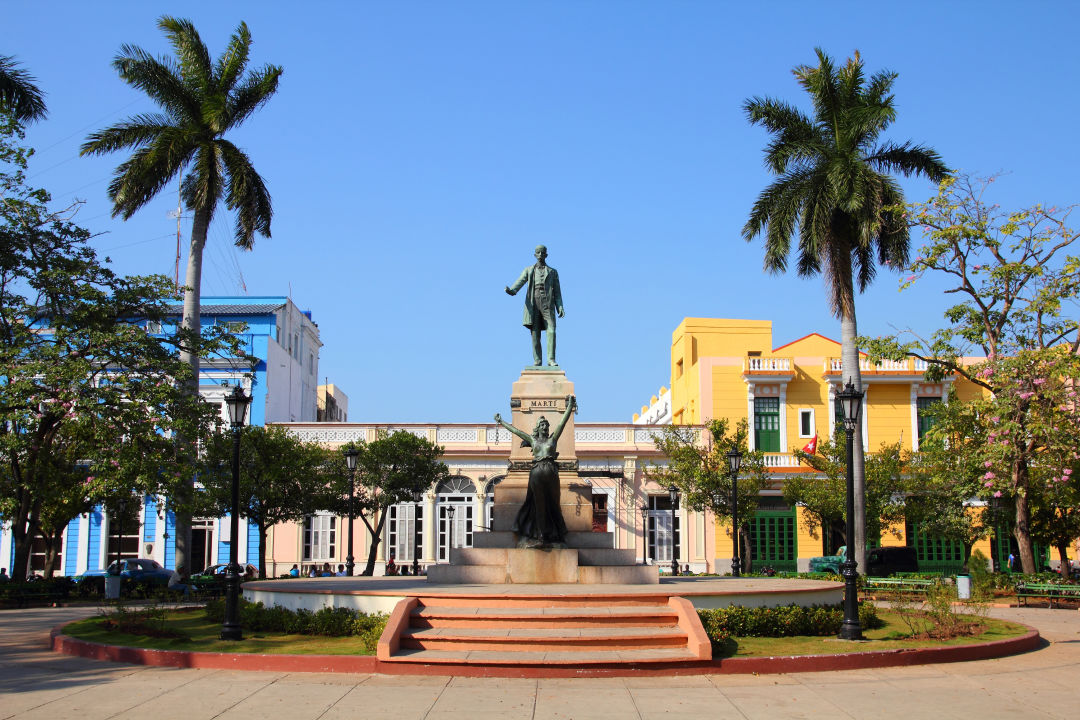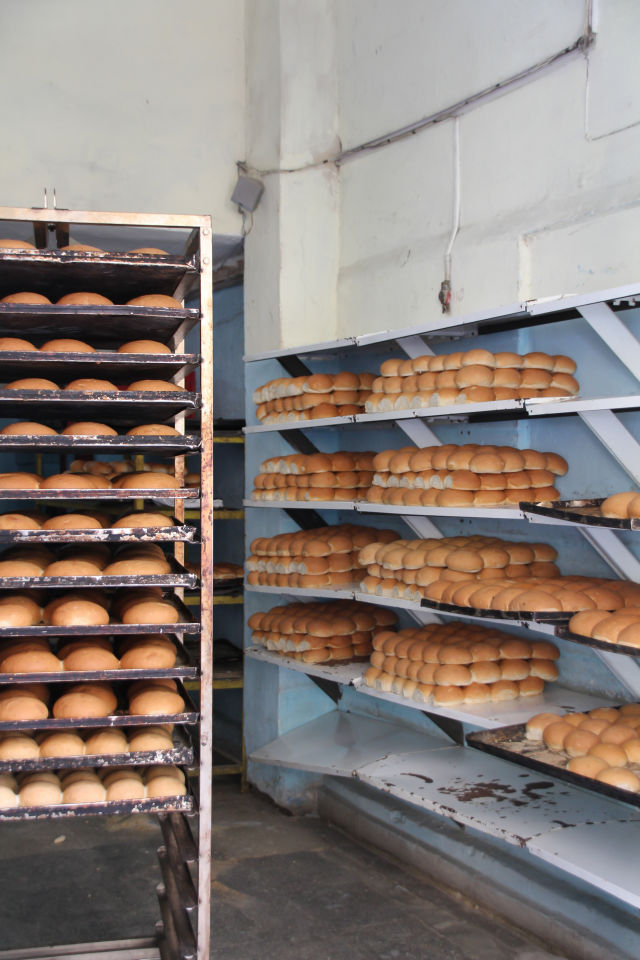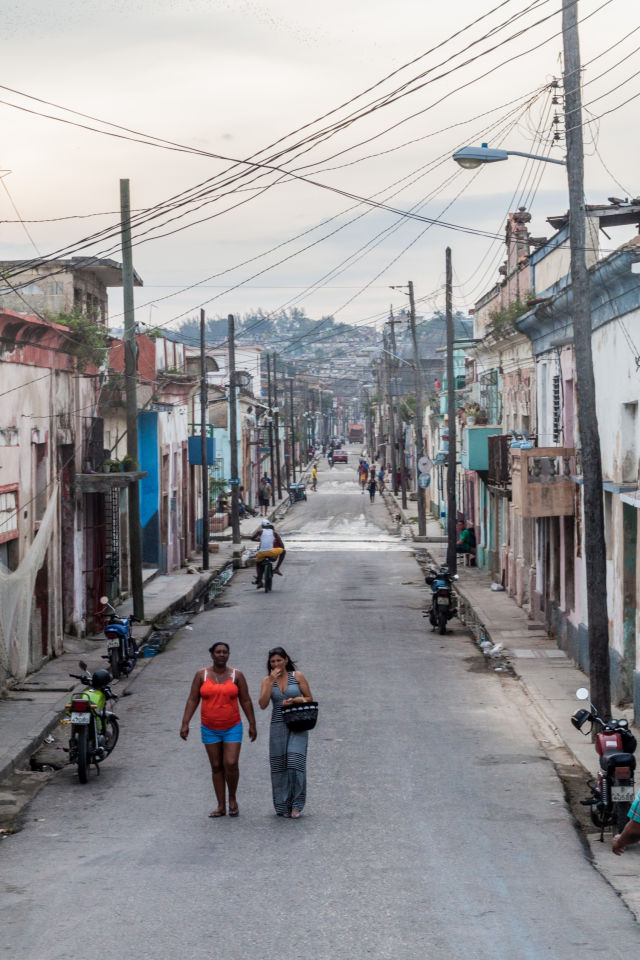The Poetry of Cuba

Havana.
Image: Delpixel/Shutterstock.com
One three-hour flight to Havana from Houston later, and it’s drizzling. We deboard in the rain, and I hasten my way to customs, passing through a small, wooden door and handing my passport and papers to a woman in a crisp uniform who kindly asks if I've ever traveled to Africa. "¿Ha viajado a Africa?”
“Educational purposes," I answer—my professor said that whatever immigration asks, answer with educational purposes. She looks at me funny. But after a couple of awkward laughs and repetitions later, I piece together her question and say, “No, nunca.” I smirk, she smirks, and we both laugh. At me, of course.
Technically, I’ve come to Cuba to do one thing: Translate poetry. Along with 18 others, I’ve signed up for a translation course through the University of Houston. But sometime between the class registration and the plane ride to Havana, I’ve fallen hook, line and sinker with romanticized visions of vintage cars—they’re the first thing I even see outside of the cramped airport—mojitos and cigars dancing in my head. But, like the United State's relationship with Cuba—which went south shortly after the 1959 Cuban Revolution and was only recently restored during Obama’s presidency more than half a century later—it’s all a bit more convoluted than I thought.
Given the Trump administration’s seemingly restrictive travel laws, going to Cuba is actually easier than it seems. Although people can’t legally be a tourist, they can obtain a visa by fulfilling one of 12 reasons, from journalism to religious reasons to my checkbox: Educational purposes.

Jose Marti and Liberty statues in Matanzas.
Image: Tupungato/Shutterstock.com
After one, let’s just say, adventurous weekend in Havana, I head with my peers to my professor’s hometown, Matanzas, the Athens of Cuba. While Havana may be the go-to destination for globe-trotters, nothing can compare to Matanzas and its poetry scene, hence its Grecian slug. At the city’s center stands a statue of famed poet José Martí, who authored the lyrics to Guantanamera, arguably Cuba’s most famous song and one of my personal favorites.
It’s a two-hour drive from Havana–ours includes a pit stop at a giant bridge and a small questioning by government officials—to the Hostal Azul, a three-story boarding house in the heart of the city. We enter its deep blue-painted hardwood doors to find the owner, Don Joel, a small-statured man of very few words, turning some of us away. There are 18 of us and only one Hostal Azul, so a few of us set up camp in Hostal Río, a bright-yellow hostel run by Don Joel’s parents a few streets down.
Our first morning in Matanzas, my friend and I wake up to the sound of air conditioning, a luxury mostly reserved for foreigners. We throw on our lightest clothes possible, zhuzh our hair a bit, slap on some sunscreen and inhale a bit of deet. I’d say now we’re ready to battle the forces of Cuba—the sun and its army of mosquitoes.

Here for the bread.
Image: D Currin/Shutterstock.com
On our way to Hostal Azul for breakfast, we end up taking a longer route than needed, and I’m already sweating, in need of a swig of the chalky bottled water. Somewhere along our zig-zag path, we end up passing a panadería at the corner of Calle medio and Calle 290. Although the air in the city smells like exhaust pretty much 24/7, the sweetness surrounding its bakeries cuts through the crude air. Forget the cars, I’m here for the bread.
As we pass the bakery, we can’t help but notice these men clad all in white, chilling on the street corner. They check out my friend and me, who obviously aren’t Cuban. I brush it off and continue my way to the blue house.
After feasting on fruit, fried eggs and little cakes for breakfast, we meet our poets in Ediciones Matanzas, one of Matanzas’s famed publishing houses. Grouped in pairs, my partner and I are tasked with translating nine of Israel Domínguez’s poems. He's a gray-haired poet, smiling ear to ear, and realizes within the first 30 seconds of meeting us that he should probably speak English. I wonder since he speaks English so well, why couldn’t he translate the poems himself. Turns out translating poetry is much more difficult than I thought. Translate one word incorrectly and the whole meaning of a 20-word poem can change. For a week, the translation in my head is don’t f*** this up, Josh.
All week, we see the same young and fit guys dressed head-to-toe in white every morning. Like clockwork, they give us the regular smile and a good-and-long stare. Now, I’m curious. I’ve spent a week here. I’ve never seen anyone in all white hanging out on the street besides them. Who are they? Why are they hanging out on the street at the crack of dawn? Why are they in all white? Are they part of a gang? Do they control part of this neighborhood?
Using my journalistic skills, I ask a question. I find out they’re bread makers, and they wear white so that the flour won’t show. The bread shop is right in front of them. I also find out another something: I’m an idiot.
On one of our last nights, we go to see a Cuban drag show. It's a far walk, but from what I can tell, it's quite safe to walk around at night. We enter a small theater with bolted red velvet seats. It's just us at first, but a few others eventually fill in. Music chimes and the queen finally graces us with her presence.

A drag show gets real in Matanzas.
She makes Carmen Miranda look like a bowl of fruit. Subtle is not in her dictionary, but then again, when is a drag queen ever subtle? However beautifully extra she is in appearance, I cannot seem to understand her beautifully extra high-pitched accent; I thought I was finally able to understand Cubans. Wrong. I squint my eyes. I turn my head. I lean in a bit. But I cannot read the words on her rosy red lips. About an hour into her extravagant performance and now dressed as Lady Liberty, the queen peels me, out of all people, from my chair and onto the stage.
I proceed to do what I do best: Make a fool of myself. When she asks me a question, I just say random words, to hide the fact that I don’t understand. Eventually, she sees through my act and calls my professor to the stage. But even she has trouble making out the queen’s questions. Oh boy, I think to myself, this is awkward. But after the audience laughs a little as I moan a little, hiding behind a curtain, the queen pities me enough to let me sit. Then she starts to undress.
The flounces stop flouncing and the hands stop swirling. The room is still. She slows down her speech enough for me to understand bits and pieces. From what I can decipher, she says that even though she fled Cuba for the U.S., she could never escape it. She reaches for her clunky pumps and flings them aside and unzips her bustier and even takes off her fake boobs.
She continues her speech, delving into what she has faced as a gay Cuban man—leaving her home country, moving to the U.S., feeling like she’s not accepted in either society. She removes the wig. She removes her jewelry. She removes her drag armor. In the end, with almost everything stripped off, the Cuban queen stands before us a man with smeared makeup and disheveled, bright green hair. The show is over.

Matanzas, Cuba.
We head over to Ediciones Matanzas to recite our finished translations on our last day. One by one, each of the poets recite their original poem, and then my classmates recite their corresponding translations.
It's now my turn, and I make my way to the front of the makeshift auditorium of plastic stacking chairs. The room is silent. Israel Domínguez recites his two poems, smiling like he always does. I choose to recite his poem, Into the West, based on a 2005 Steven Spielberg miniseries that follows the story of both a white and Native American family in the early American West, which Dominguez uses to comment on his own daughter’s emigration from Cuba.
Even though many of the poets in the room don’t speak English, I don’t want to let them down. I start to read, and Israel listens and smiles ear to ear. Out in their wobbly chairs, even the audience, who don't know what I'm saying seem to somehow understand the poem.
Into The West
Toward the West traveled men and women
attracted by the idea of happiness.
Those that weren´t able to see the end were happier
than those that lost their souls long before dying.
When the iron horse traveled through the Great Plain,
where the buffalo roamed freely,
men and women founded their towns
like someone who mounts a set or constructs a scene.
Jacob Wheeler, wheel-maker,
traveled from Virginia to the Lakota Nation.
There, he would meet Loved by the Buffalo,
a young man chosen by the Gods.
While Jacob fixed metal over wood in his father´s forge,
Loved by the Buffalo made WakanTanka´s Circle:
a wheel that travels toward other circles,
a stone circle that travels toward the stars.
The Wheelers´s wheel separated families in Illinois, Maryland, Kentucky…
WakanTanka´s Circle, in the Great Plain, united them.
When my daughter departed into the West
on wheels that hide in the air,
I thought of Jacob Wheeler.
I laid stones on my roof
and lifted my hands toward the heavens.




